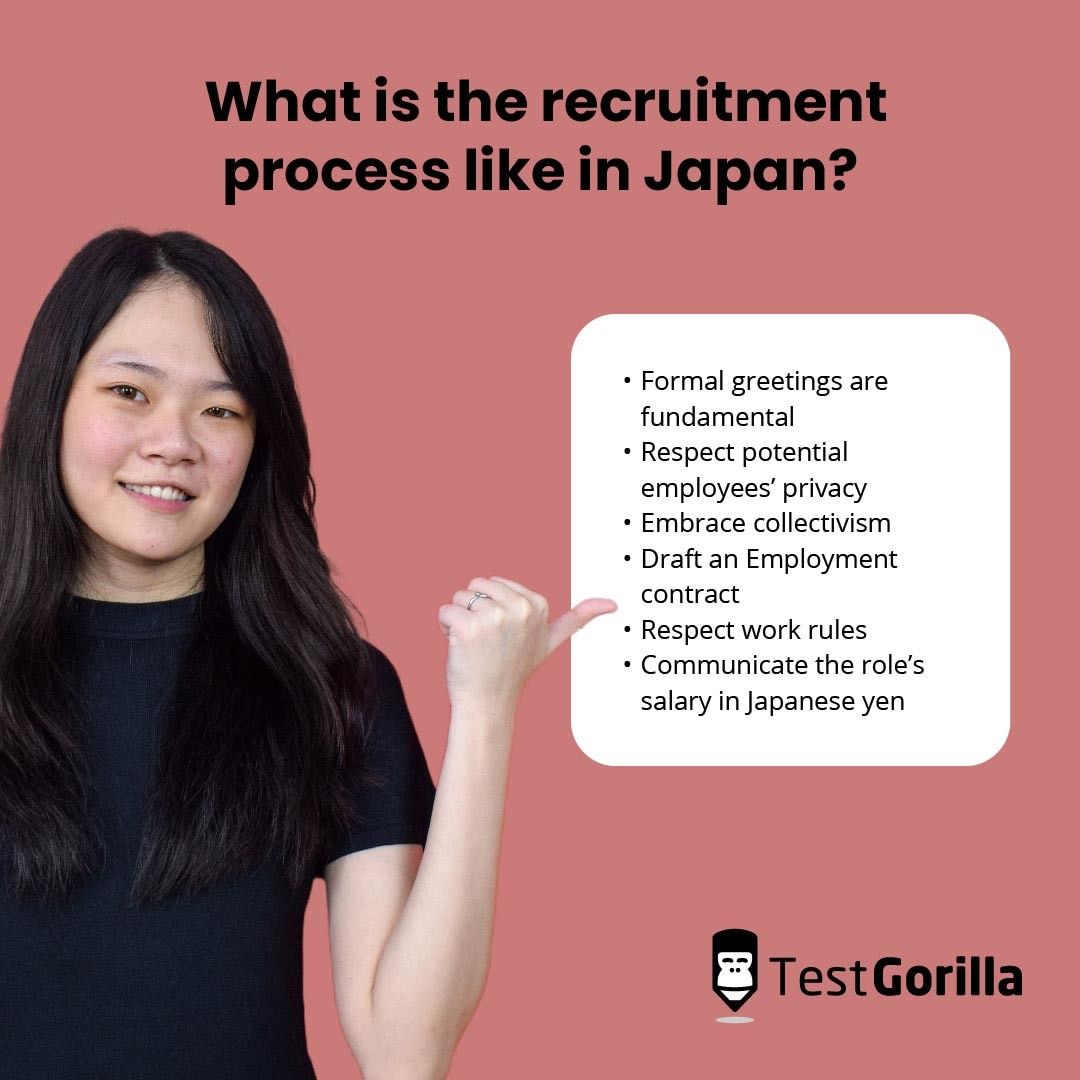Understanding Japanese recruitment customs and regulations can be tricky, but it’s essential if you’re trying to find top talent there. However, recruiting in Japan doesn’t have to be a struggle.
In this article, you’ll find out what the recruitment process is like in Japan, the fundamental skills you should look for as a recruiter, and how to assess these skills objectively.
You’ll also learn whether recruiting foreigners is common in Japan and how you can accurately assess candidates’ skills with pre-employment tests like our Japanese B1 skills test.
So read through this article to find all the information you need.
Table of contents
- What is the recruitment process like in Japan?
- Is recruiting foreigners common in Japan?
- Which skills should you look for when recruiting foreigners in Japan?
- Are Japanese language skills critical for employees in a Japanese organization with international offices?
- Recruiting in Japan: Find the best applicants for your business
What is the recruitment process like in Japan?
There are a few essential points to consider when recruiting talent in Japan:
Formal greetings are fundamental
Formal greetings are fundamental when you first meet a candidate in Japan during an in-person interview. This means that you should be familiar with Japanese customs before meeting an applicant.
For instance, you can expect your candidate to bow when they meet you and then shake hands with you.
Part of the formal greeting process for recruitment in Japan involves using formal titles. In other words, avoid using your candidate’s first name when you speak to them during the interview.
It’s crucial to respect potential employees’ privacy
Remember to uphold your new hire’s privacy when conducting your recruitment process in Japan.
Steer clear of potentially invasive questions, even as you proceed with later interview stages and onboarding. Family and relationships are not topics you should raise here. In some cases, you should also avoid talking about your new hire’s work history.
Embracing collectivism is vital
Since Japan has a collectivistic culture, team contributions take precedence over individual contributions. With this cultural norm in mind, don’t be discouraged by an applicant who doesn’t overly sell themselves or emphasizes their collaboration skills and ability to work within a team.
Drafting an employment contract is critical
An employment contract is essential for recruitment in Japan. You must prepare a contract containing your new employee’s expectations and terms related to employment termination.
Under the Japanese Labor Standards Act, you must also specify the working conditions, wages, promotion-related information, the duration of the contract, and retirement information.
It’s important to respect work rules
Does your company have more than 10 employees? If so, you must follow rules related to the number of workers you have employed and file them with the Labor Standards Inspection Bureau.
Other recruitment rules you have to adhere to in Japan involve holidays, work hours, and wages.
You need to communicate the role’s salary in Japanese yen
When entering the negotiation phase of the recruitment process, remember that you must tell the applicant the salary of the role in Japanese yen. If there are other monetary benefits, such as bonuses, you must also state them in Japanese yen.
Is recruiting foreigners common in Japan?
Yes, recruiting foreigners is common in Japan. In 2021, there were 1.73 million foreign workers, an increase from 1.65 million in 2019.
One of the main reasons that foreign recruitment is common in Japan is that applicants’ backgrounds and experiences may give them a significant advantage.
For example, since Japanese companies have been opening international offices over the past 20 years, a lot of recruiters seek applicants with knowledge of global markets and the right international linguistic skills.
Many foreigners working in Japan offer this skill set to international businesses.
The best insights on HR and recruitment, delivered to your inbox.
Biweekly updates. No spam. Unsubscribe any time.
Which skills should you look for when recruiting foreigners in Japan?
You should look for candidates with more than just international language skills when recruiting foreigners in Japan – after all, just because your applicant understands a foreign language, it doesn’t mean their communication skills are excellent in a business context.
Applicants need solid communication skills to share ideas clearly and efficiently with their co-workers. These skills are vital for applicants for an international office since they may need to communicate information with different departments and offices worldwide.
Our Communication skills test is a reliable option for assessing your applicants’ communication abilities.
This test will enable you to review your candidates’ skills in active listening, written communication, and message summarization. It will also help you evaluate their communication etiquette.
Of course, your applicants should also have expertise in the Japanese language. Do you need a method to assess your candidates’ proficiency in Japanese?
Use our Japanese B1 or C1 test. These tests will help you assess your applicants’ grammar, reading, writing, and listening skills at the B1 and C1 levels, respectively.
Are Japanese language skills critical for employees in a Japanese organization with international offices?
Japanese language skills are an asset for employees in a Japanese business with international offices.
These skills may be less sought after for certain roles, including programming and software development. In this field, the practice of hiring foreign engineers with no Japanese skills is increasing.
However, candidates who understand the Japanese language have more opportunities to collaborate and make a greater impact.
Recruiting in Japan: Find the best applicants for your business
Recruiting in Japan requires you to adhere to customs and follow specific rules, but the process can be easier than you think. Remember, to find the best applicants for your company, ensure they have the right skill set.
If you’re looking for a top Japanese speaker, check out our Japanese C1 test to review your candidates’ language proficiency. Hire the best applicants for your organization, and complete your recruitment process in Japan with minimal effort.
You've scrolled this far
Why not try TestGorilla for free, and see what happens when you put skills first.















